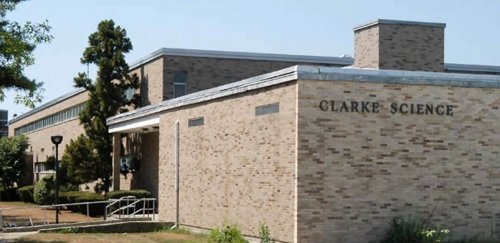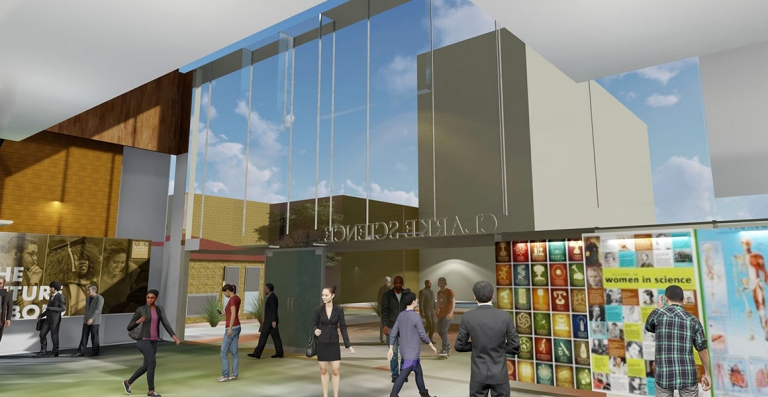RIC’s Clarke Science Building is on the Ballot, March 2
- News & Events
- News
- RIC’s Clarke Science Building is on the Ballot, March 2

If voters approve the bond, renovation will begin with a new addition for research laboratories.
On March 2 Rhode Island College will be on the ballot as bond referendum #1. If approved, this bond will provide $107.3 million to higher education, with $38 million going toward much-needed renovation of the John Clarke Science Building at Rhode Island College.
Built more than 50 years ago, the John Clarke Science Building is home to the Department of Physical Sciences, which offers degree programs in physics and chemistry as well as courses in Earth and space sciences.
Not only physics and chemistry majors but hundreds of students in the health fields, education and the School of Arts and Sciences take physical sciences courses. Faculty also teach a significant number of courses in the General Education Program. Suffice it to say, the building is well used; however, it is also rundown.
According to Director of Capital Projects Kevin Fitta, "Much of the building hasn't changed since it was first built in 1962. There have been some renovations over the years to specific rooms and laboratories, but generally speaking, the building is in need of major upgrades."
Faculty talk of leaky ceiling pipes; falling ceiling tiles; freezing pipes that burst and flood storage, office and classroom spaces; lecture halls that regularly flood in wet weather; faulty heating and cooling systems; air quality issues caused by fumes from mechanical, electrical and plumbing systems; floor tiles that contain asbestos; inadequate bathrooms and elevators; and accessibility problems for students with disabilities.
"Essentially, the entire building needs to be reconstructed and reconfigured," Fitta says. "The lab spaces were not designed to accommodate today's teaching methods."

If voters approve the bond, renovation will begin with building an addition onto the end of the building (the library side of Clarke Science) to house new research laboratories for every full-time faculty member. Such a laboratory-rich environment will serve students as well as faculty since many physics and chemistry majors participate in research mentored by faculty.
"Once the addition is completed, the original building will undergo a gut renovation," says Fitta, "except for certain teaching labs that were recently renovated." The original building will contain new faculty offices, additional lab spaces and classrooms along with common areas and collaborative spaces for students.

"If the bond goes through, renovation is expected to be completed by 2024," Fitta says, "with about a year spent on design and 18 to 24 months on construction."
Completion can't come too soon for faculty members like Jamie Towle-Weicksel, associate professor of chemistry and biochemistry. Like many of her colleagues, Towle-Weicksel is deep in research with her students.
"It is my hope," she says, "that with a new state-of-the-art building we will be able to focus more on science and continue to provide experiential learning experiences for the next generation of scientists."
